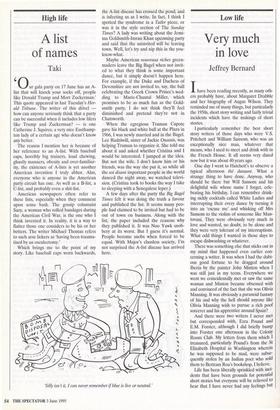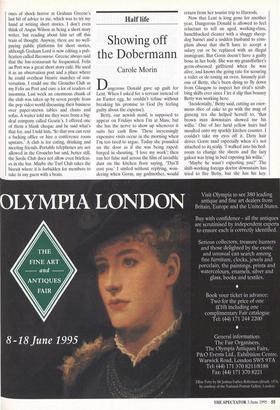Low life
Very much in love
Jeffrey Bernard
Ihave been reading recently, as many oth- ers probably have, about Margaret Drabble and her biography of Angus Wilson. They reminded me of many things, but particularly the 1950s, short story writing and fairly trivial incidents which have the makings of short stories.
I particularly remember the best short story writers of those days who were V.S. Pritchett and William Sansom, who was an exceptionally nice man, whatever that means, who I used to meet and drink with in the French House. It all seems very dated now but it was about 40 years ago.
One day I went to Hatchett's to observe a typical afternoon the dansant. What a strange thing to have done. Anyway, who should be there but Will Sansom and his delightful wife whose name I forget, cele- brating his birthday. I can remember drink- ing sickly cocktails called White Ladies and interrupting their every dance by turning it into an 'excuse me' and whisking off Mrs Sansom to the violins of someone like Man- tovani. They were obviously very much in love and wanted, no doubt, to be alone and they were very tolerant of my interruptions. What odd things I wanted in those days to escape dishwashing or whatever.
There was something else that sticks out in my mind that happened even earlier con- cerning a writer. It was when I had the dubi- ous good fortune to be dragged around Iberia by the painter John Minton when I was still just in my teens. Everywhere we went we coincidentally met or saw the same woman and Minton became obsessed with and convinced of the fact that she was Olivia Manning. It was obviously a paranoid fantasy of his and why the hell should anyone like Olivia Manning wish to pursue a rich poof sorcerer and his apprentice around Spain?
And there were two writers I never met but corresponded with, Ezra Pound and E.M. Forster, although I did briefly bump into Forster one afternoon in the Colony Room Club. My letters from them which I treasured, particularly Pound's from the St Elizabeth Hospital in Washington wherein he was supposed to be mad, were subse- quently stolen by an Indian poet who sold them to Bertram Roa's bookshop, I believe.
Life has been liberally sprinkled with inci- dents that have been grounds for potential short stories but everyone will be relieved to hear that I have never had any feelings but ones of shock horror at Graham Greene's last bit of advice to me, which was to try my hand at writing short stories. I don't even think of Angus Wilson as being a short story writer, but reading about him set off this train of thought. Anyway, there are no well- paying public platforms for short stories, although Graham Lord is now editing a pub- lication called Raconteur. Greene always said that the bar-restaurant he frequented, Felix au Port was a great short story café. He used it as an observation post and a place where he could overhear bizarre snatches of con- versation. I could use the Groucho Club as my Felix au Port and cure a lot of readers of insomnia. Last week an enormous chunk of the club was taken up by seven people from the pop video world discussing their business over paper-strewn tables and chairs and sofas. A waiter told me they were from a big- deal company called Gearie's. I offered one of them a blank cheque and he said what's that for, and I told him, 'So that you can rent a fucking office or hire a conference room upstairs.' A club is for eating, drinking and meeting friends. Portable telephones are not allowed in the Groucho bar and, better still, the Savile Club does not allow even briefcas- es in the bar. Maybe the Turf Club takes the biscuit where it is forbidden for members to take in any guest with a brain.



































































 Previous page
Previous page